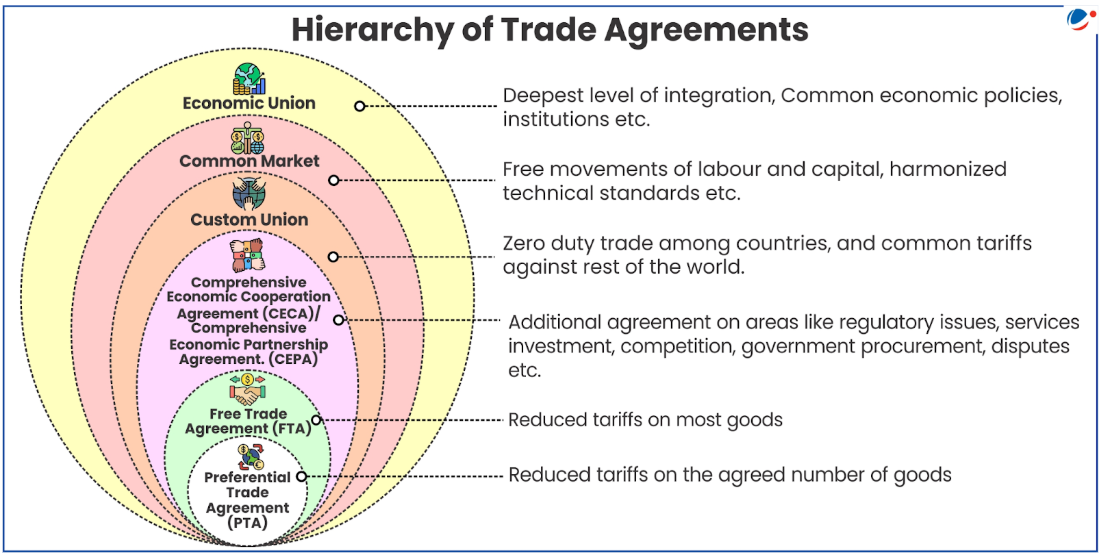ndia and the UK have taken a major step in building a stronger economic partnership with the signing of the Comprehensive Economic and Trade Agreement (CETA).
The signing of the India-UK Comprehensive Economic and Trade Agreement (CETA) on July 24, 2025, marks a pivotal moment in bilateral economic relations between two major global economies. This FTA India-UK represents the largest trade deal the UK has negotiated since Brexit and India's biggest agreement with a G7 economy in over a decade.
Understanding Free Trade Agreements
Free Trade Agreements (FTAs) are strategic arrangements between two or more countries or trading blocs that agree to reduce or eliminate customs tariffs and non-tariff barriers on substantial trade between them. These comprehensive agreements cover trade in goods (agricultural and industrial products), services (banking, construction, trading), and intellectual property rights.

Roadmap of India-UK Vision 2035
The India-U.K. Vision 2035 framework replaces the earlier ‘Roadmap 2030’. This establishes six key pillars of bilateral cooperation designed to strengthen ties between the two nations across multiple sectors.
- Trade and Economic Growth pillar focuses on deepening commercial relationships through the signing of the India-UK Comprehensive Economic and Trade Agreement (CETA) while working toward establishing a Bilateral Investment Treaty (BIT) to facilitate cross-border investments and economic integration.
- Under Technology and Innovation, both countries are committed to creating the UK-India Research & Innovation Corridor.
- Defence and Security cooperation encompasses the co-development of critical military technologies, particularly Jet Engine Advanced Core Technologies (JEACT) and Electric Propulsion systems, while establishing strategic convergence on regional security matters in the Indo-Pacific and Indian Ocean Region.
- Climate and Clean Energy collaboration addresses pressing environmental challenges through joint efforts in energy storage solutions, grid transformation technologies, and offshore wind development.
- Education and People-to-People Ties pillar aims to strengthen cultural and academic bonds by facilitating the establishment of UK university campuses in India, enhancing educational opportunities and fostering deeper interpersonal connections between the two societies.
- Multilateral Cooperation involves coordinated advocacy for comprehensive reforms of major international institutions, including joint efforts to reform the UN Security Council, World Trade Organization, World Health Organization, International Monetary Fund, and World Bank to better reflect contemporary global realities and ensure more equitable international governance.
Unprecedented Market Access and Economic Benefits
Comprehensive Tariff Elimination
The India-UK FTA delivers unprecedented market access benefits for Indian exporters. The agreement provides duty-free access for 99% of Indian exports to the UK, covering nearly 100% of the bilateral trade value. This represents a major competitive advantage for Indian businesses, particularly in labor-intensive sectors that form the backbone of India's export economy.
Reciprocally, India has agreed to reduce tariffs on approximately 90% of UK goods, bringing average duties down from 15% to 3%. The phased implementation ensures that 85% of these products will become entirely tariff-free over the next decade. This creates substantial opportunities for British exporters while allowing Indian industries time to adapt to increased competition.
Strategic Sectoral Gains
The agreement opens the UK's $37.5 billion agricultural market to Indian producers, with over 95% of agricultural and processed food items gaining duty-free access. This provides Indian farmers with direct access to premium buyers within the UK's agri market. Key beneficiaries include traditional exports like turmeric, cardamom, pepper, mango pulp, and ready-to-eat meals.
The fisheries sector also stands to gain significantly, with coastal states like Andhra Pradesh, Kerala, and Tamil Nadu poised to benefit from the elimination of duties ranging from 4.2% to 8.5% on marine products. Notably, sensitive sectors such as dairy, apples, and edible oils remain protected with no tariff cuts, safeguarding the interests of domestic farmers. Furthermore, the absence of safeguard duties ensures stable, penalty-free market access, and traditional farming knowledge receives patent protection, directly benefiting farmers.
Likewise, India's textile industry, employing millions in labor-intensive manufacturing, secures zero-duty access for 1,143 tariff lines. This eliminates the competitive disadvantage India previously faced against countries like Bangladesh and Pakistan.
Additionally, the agreement strengthens India's position as a global pharmaceutical hub while ensuring that intellectual property provisions will not impede India's ability to provide affordable medicines. This balance between innovation incentives and public health access represents a crucial victory for India's negotiating strategy.
Services Revolution and Professional Mobility
The services sector, representing India's greatest competitive advantage, receives substantial benefits under the agreement. The India-UK FTA includes commitments covering IT/ITeS, financial services, legal services, education, and professional consulting. These provisions are expected to increase India's software services exports by approximately 20% annually once fully implemented.
Enhanced Professional Mobility
An important aspect of the agreement is the comprehensive framework for Indian professional mobility. The deal "locks in" predictable access for various categories of Indian professionals, including:
- Business Visitors: Streamlined processes for meetings, conferences, and contract negotiations
- Intra-Corporate Transferees: Easier work permissions for experienced employees relocating to UK branches
- Independent Professionals: Enhanced access for architects, engineers, chefs, yoga instructors, and musicians
- Cultural Professionals: Specific annual quota of 1,800 positions for chefs de cuisine, yoga instructors, and classical musicians
The Double Contribution Convention (DCC) represents a major breakthrough, exempting Indian workers and their employers from UK social security contributions for up to three years. This provision improves the cost competitiveness of Indian talent and demonstrates a holistic approach to trade agreements that addresses practical challenges faced by mobile professionals.
Strategic Concessions and Balanced Negotiations
Automotive Sector Dynamics
India's approach to automotive tariffs demonstrates sophisticated negotiation strategy. The agreement reduces duties on high-end UK automobiles to 10% within specific quotas, while explicitly protecting the mass-market segment where domestic manufacturers are active.
This tiered liberalization allows luxury brands like Jaguar Land Rover, Rolls-Royce, and McLaren to benefit from reduced prices in the Indian market while safeguarding domestic automotive manufacturing. The approach creates opportunities for Indian auto-component manufacturers to integrate into global value chains while protecting the foundation of India's automotive industry.
Spirits and Luxury Goods
The agreement includes tariff reductions on British whisky and gin, decreasing from the current 150% to 75% immediately and further to 40% over ten years. While this represents a substantial concession to UK interests, it demonstrates India's strategic willingness to open niche luxury markets in exchange for broader access for its labor-intensive exports.
Digital Trade and Modern Provisions
The India-UK FTA incorporates forward-looking provisions on digital trade, reflecting both nations' commitment to facilitating 21st-century commerce. Key digital trade commitments include:
- Recognition of electronic contracts and digital signatures
- Prohibition of forced disclosure of source code
- Limitations on data localization requirements
- Promotion of paperless trade and digital system compatibility
These provisions aim to make cross-border commerce more cost-effective and accessible, particularly benefiting small and medium enterprises seeking to participate in international trade.
Government Procurement Opening
This agreement signals a shift in India's government procurement policy. India will now open federal-level government contracts worth over Rs 2 billion to British companies.
Additionally, Indian MSMEs can now participate in UK government procurements. This represents a departure from India's traditional approach of using procurement as a tool for domestic industrial growth.
Geopolitical Significance and Strategic Alignment
Beyond economic benefits, the agreement strengthens the broader UK-India Comprehensive Strategic Partnership. The trade deal complements existing cooperation in technology security, defense, climate action, and maritime security, creating a multi-dimensional relationship that extends far beyond commercial exchange.
The timing of the agreement is particularly significant given global trade tensions and supply chain restructuring efforts. For the UK, the deal delivers the "Global Britain" dividend that has been elusive since Brexit, providing preferential access to a market of 1.4 billion people. For India, it represents early access to European markets as its export-led growth strategy accelerates.
Implementation Challenges and Future Prospects
The agreement must now navigate ratification processes, with the UK Parliament expected to approve the deal within approximately one year. Successful implementation will require careful attention to:
- Regulatory Harmonization: Streamlining standards and certification processes
- Capacity Building: Supporting MSMEs in understanding and meeting UK market requirements
- Monitoring Systems: Tracking benefits and addressing implementation challenges
The agreement establishes precedents for India's ongoing trade negotiations with the European Union, United States, and other major economies. The comprehensive nature of the UK deal, including modern provisions on digital trade, environmental standards, and gender equality, positions it as a template for future negotiations.

Conclusion
The India-UK CETA represents more than a bilateral trade agreement; it embodies a new model for comprehensive economic partnership. The agreement establishes a "gold standard" for future trade negotiations by balancing market opening with domestic protection and incorporating modern trade issues while safeguarding core interests. It also facilitates professional mobility while respecting immigration sovereignty, further solidifying its benchmark status.
Master International Trade Dynamics & Economic Policy with VisionIAS Comprehensive Current Affairs →